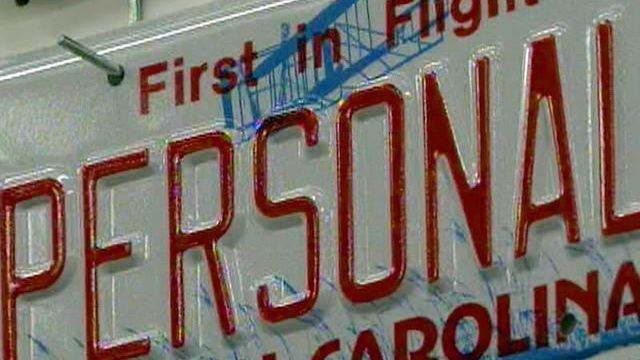DMV scraps flat plates
Less than a year after the state DMV began issuing personalized and specialty license plates without embossed letters and numbers, the agency is ending the experiment.
Posted — UpdatedThe DMV was looking for a way to save money last year, so it decided to produce tags that are thinner and flatter than the traditional embossed plates.
"We believed that, if we went to a lighter-weight aluminum, for instance, we could get five plates out of a pound rather than three-and-a-half," said Tony Spence, the DMV's assistant director for vehicle registration.
Last spring, the state began producing personalized plates and most of the state's 185 specialty plates – they represent colleges, sports teams and special-interest groups – on new equipment that rolled out flat tags.
Inmates at the North Carolina Correctional Institution for Women, who craft and cut more than 2.5 million license plates a year, continued to use older equipment to produce embossed regular tags.
The two versions differ in thickness by 0.001 inch, but there is a marked difference in the look, feel and durability of the flat plates. That difference prompted a rash of complaints from drivers after the DMV began issuing the flat tags in September.
"We got feedback that they were not really happy or satisfied with the quality," Spence said.
"Your numbers are flat; they're not embossed, which gives you a 3-D type dimension," said Chuck Congleton, director of signs and tags for the Correction Enterprises unit of the state Department of Correction. "As far as readability, to a personal opinion, the embossed might be a little easier to read."
Some law enforcement agencies also criticized the flat plates, saying they looked too much like plastic novelty plates, Spence said.
"They felt that, perhaps, it might be harder for them to tell the plate was in fact an official plate," he said.
Aside from the complaints, the DMV realized no savings from the flat tags, which was the primary reason for switching.
"We were not receiving the savings we thought we would initially up-front (because) our scrap rate went up," Congleton said.
Officials couldn't provide figures for how many flat tags have been produced. The state makes about 60,000 personalized and specialty plates a year, but the flat version wasn't used on all specialty plates, they said.
Spence said production of the flat tags will cease when the supply of thinner aluminum runs out in May.
"We have decided to go back to embossing our personalized and specialty plates," he said.
The state lost no money on the experiment, he said, because the new production equipment will be used for embossed plates and all of the flat plates produced will be issued.
Drivers who have the flat tags cannot trade them for embossed plates until they renew their tags, officials said.
• Credits
Copyright 2024 by Capitol Broadcasting Company. All rights reserved. This material may not be published, broadcast, rewritten or redistributed.





